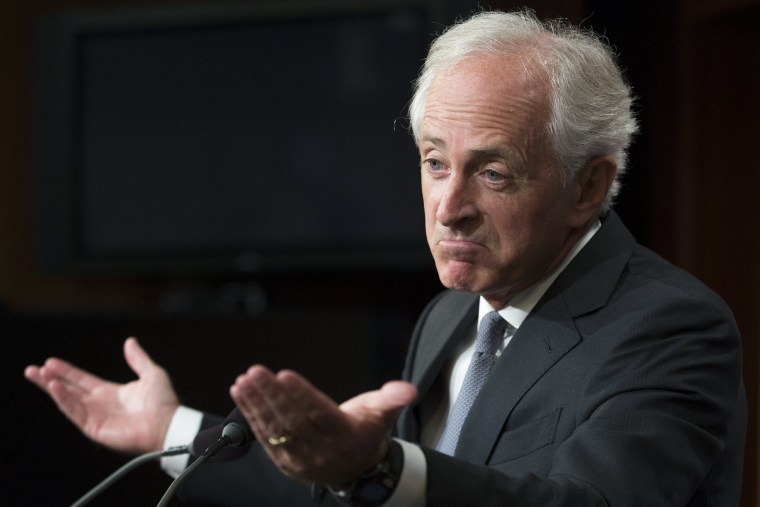Sen. Bob Corker (R-Tenn.) had been consistent throughout the debate over the Republican tax plan: if the GOP proposal added to the deficit, he couldn't vote for it. Two weeks ago, in a close vote on the Senate floor, Corker stuck to his guns, and was the only Republican in the chamber to oppose the regressive and unpopular bill.
As recently as Thursday, the Tennessee lawmaker complained, "The deficit concerns certainly have not been addressed." And yet, literally one day later, after his GOP colleagues ignored his concerns, Corker announced he'd changed his mind and would vote for the plan anyway.
The question, of course, is why he abandoned his principles and broke his word. Over the weekend, the controversy over Corker's strange reversal intensified.
The International Business Times reported that congressional Republicans added a special tax provision to the final GOP package -- which didn't appear in either the original House or Senate plans -- to benefit Americans with large commercial real estate holdings. Corker has large commercial real estate holdings, which means he stands to benefit personally from the plan he opposed up until Friday.
The controversy intensified further when Senate Majority Whip John Cornyn (R-Texas) appeared on ABC News' "This Week" yesterday and George Stephanopoulos asked about the specific provision benefiting those with real estate income through LLCs. When the host asked if Republicans are prepared to undo this, Cornyn dodged. It led to this exchange:
STEPHANOPOULOS: [This provision] apparently was added at the last minute. Why was that done? Why was it necessary to include that provision?CORNYN: Well, we were working very hard. It was a very intense process. As I said, the Democrats refused to participate. And what we've tried to do is cobble together the votes we needed to get this bill passed.
When the host asked if this provision was used to win Corker over, Cornyn dodged again, sticking to vague talking points.
Instead of addressing questions of possible corruption, the #2 Republican in the Senate raised the volume on those questions.
To be sure, Corker, who's retiring from Congress next year, isn't a lawmaker with a reputation for corruption or scandal, but at face value, this is an unsettling story. The Tennessee Republican was steadfast in his concerns about his party's tax plan for more than two months. Then GOP leaders quietly made a last-minute change to the bill that would put more money in Corker's pocket. Then he announced he'd changed his mind about the bill -- even though the policy concerns Corker had raised hadn't been addressed at all.
Then a member of his party's leadership told a national television audience the last-minute change was made in order to help "cobble together the votes we needed to get this bill passed."
For his part, Corker told the International Business Times on Saturday that he hadn't read the bill he now supports -- which apparently is supposed to be part of a defense. Yesterday afternoon, perhaps realizing how this whole story looked, Corker also wrote to Senate Finance Committee Chairman Orrin Hatch (R-Utah), asking for "an explanation" as to how and why this provision ended up in the final package.
Corker's office added that he didn't participate in the drafting of his party's tax plan, and according to his office's claims, he didn't request any specific provisions.
I'll concede it's entirely possible that Corker had a dramatic change of heart for reasons that have nothing to do with corruption. Maybe the Tennessean was bluffing and gave up when Republicans ignored his concerns. Maybe Corker learned that Sen. John McCain's (R-Ariz.) ailments will keep him from the Senate floor this week, which meant Corker might have helped derail the legislation, which he may not have been willing to do.
But the so-called "Corker Kickback" casts a cloud of controversy over this week's proceedings.
Postscript: I imagine some of my more conservative readers will suggest special deals were struck when the Affordable Care Act was drafted, so perhaps the public should simply see these controversies as a normal part of the legislative process.
That's wrong for two reasons. First, those special deals in the ACA -- such as the "Cornhusker Kickback" -- were dropped from the final bill and were not included in the law.
Second, those deals were struck by lawmakers trying to get special benefits for their constituents, not benefits intended to benefit them personally.
